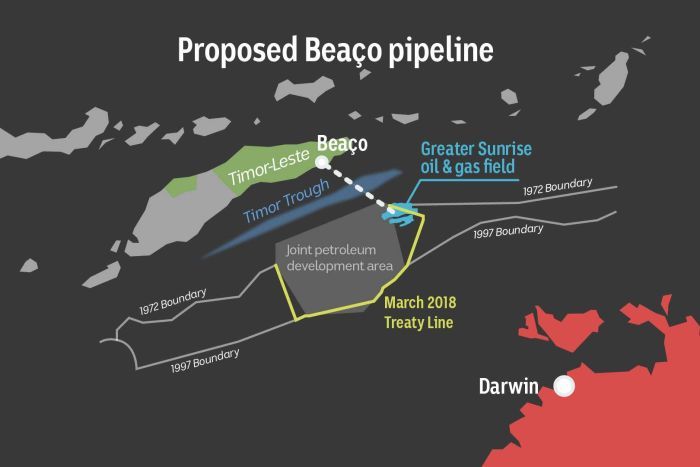
'Not even the Chinese will bankroll it': Timor Leste moves ahead with controversial gas hub
Updated
Timor-Leste has bought Shell’s stake in the rich Greater Sunrise oil and gas fields as it presses ahead with its contentious plan to pipe the natural resources to its south coast for processing.
Key points:
- Timor is spending millions to take control of oil and gas resources
- It plans to build a pipeline to its coast, a new refinery, and an airport
- Experts say project is doomed to fail
It’s another twist in a long saga as Timor-Leste, Australia, and energy companies tussle over how to exploit the reserves which are key to the small nation’s economic future.
Timor-Leste has pursued its vision for a pipeline and a domestic LNG industry for years, arguing the plan is crucial to its national development.
But Australia remains deeply sceptical, and officials worry the small nation is plunging finite resources into a doomed project which is technically and financially unfeasible.
“It’ll never happen. Not even the Chinese will bankroll it,” one Australian Government source told the ABC.
“They’re rapidly running out of money and plunging what they have into this mad dream. It’s a worry.”
In a statement to the ABC, spokesperson from the Department of Foreign Affairs (DFAT) said: “the Australian Government understands that the development of Greater Sunrise is crucial to Timor-Leste’s development and prosperity.”
“Australia wants to see Greater Sunrise developed in a way that maximises benefits and opportunities for the people of Timor-Leste.”
Shell’s 26 per cent share of Greater Sunrise will cost Dili $413 million.

Photo:
Timor-Leste’s leaders want to boost the country’s economy by building an LNG plant and refinery in Beaço. (ABC: Jarrod Fankhauser)
Last month, it announced it would purchase the 30 per cent stake in the consortium held by US company ConocoPhillips for $484 million.
If both transactions get the green light, Dili will gain a majority share of Greater Sunrise.
Timor-Leste is going on the buying spree because it’s been unable to convince the energy giants which hold the rights to Greater Sunrise to sign on to its plan.
It hopes to use its majority stake to press the Greater Sunrise consortium’s lead partner, Woodside, to either sign up to its plan or sell up its share.
Dili has asked Australian businessman James Rhee to help mediate negotiations, and to search for other sources of finance for the project.
‘The interests of small nations’
Shell’s Zoe Yujnovich said the company’s decision to sell would allow Timor-Leste to follow its aspirations.

Photo:
Feelings ran high in Dili during negotiations with Australia over control of the oil and gas reserves in the Timor Sea. (AAP/EPA: Antonio Dasiparu)
“We respect the Timor-Leste Government’s determination to develop the Sunrise fields through an onshore LNG facility on its south coast,” she said in a press release.
“Although we formed different views about the optimal development scenario, we understand the priorities of the Timor-Leste Government and wish it well in pursuing its aspirations to develop this important resource for the nation.
Timor-Leste’s former leader, Xanana Gusmao, who has been leading negotiations for his country, praised Shell’s decision to sell.
“Shell’s attitude throughout the negotiations shows that it is ready to consider not only its commercial interests but also the interests of small nations,” he said.
Only one actor with the cash for such a project
Bec Strating from La Trobe University said both Timor-Leste and Shell were being disingenuous.
“The rhetoric from the Timorese Government and Shell that this buyout is helping small-state development is incredibly misleading,” she said.
“In reality, oil corporations are being paid hundreds of millions of dollars by a developing state to abandon what is widely regarded in the industry as an unattractive development prospect.”
Dr Strating said big questions still hovered over the whole enterprise, and there was growing anxiety over the situation in Canberra.
The vast majority of Timor-Leste’s budget revenues come from oil and gas reserves which are due to run dry within five years.
“The remaining challenge for Timor-Leste is how it will get the billions of dollars required to fund the pipeline and its onshore processing facilities,” Dr Starting said.
“There appears to be only one actor with the funds to bankroll this kind of project, and that’s China.”
Topics:
First posted
